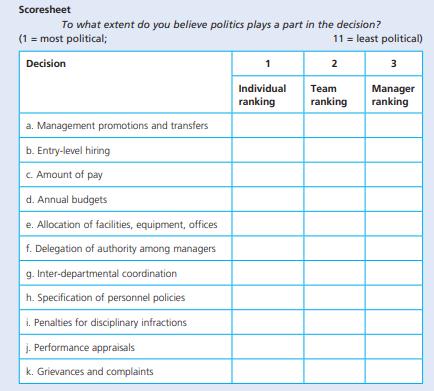1. Individually, using the worksheet, rank each of the eleven organizational decisions (a to k) in terms...
Question:
1. Individually, using the worksheet, rank each of the eleven organizational decisions (a to k) in terms of the extent to which you think politics play a part. Rank the most political decision as ‘1’ and the least political as ‘11’. Enter your ranking in the first column on your worksheet – ‘Individual ranking’.
2. Form groups of four to seven members. Rank the eleven items again, this time as a group. Use consensus to reach agreement, that is, listen to each person’s ideas and rationale before deciding. Do not vote, bargain, average, or toss a coin. Base your decision on the logical arguments made by group members rather than your personal preference. Enter your rankings in the second column on the scoresheet – ‘Team ranking’.
3. After all teams have finished, your instructor will read out the rankings produced by a survey of managers which indicates the frequency with which they believe that politics plays a part in each type of decision. As these are read out, enter them in column 3 on the scoresheet – ‘Manager ranking’.
4. Still in your groups:
(a) Compare the individual rankings (column 1) of group members. On which decisions did group members’ perceptions differ significantly? Why might that be?
(b) Compare your group ranking (column 2) with the manager ranking (column 3). On which decisions did group and managers’ perceptions differ significantly? Why might that be?
 5. In plenary, answer the questions as directed by your instructor:
5. In plenary, answer the questions as directed by your instructor:
(a) What distinguishes the most political decision items (ranked 1–4 in column 3) from the least political (ranked 8–11)?
(b) In what circumstances might a rational decision process be used in making a decision, and when would a political process be used?
(c) Research suggests that that political behaviour occurs more frequently at higher rather than lower levels in organizations. Why should this be so?
(d) How would you:
(i) apply rationality to those decisions currently possessing a large political element?
(ii) politicize decisions currently made using rational processes?
(e) How would you advise a manager who felt that politics was bad for the organization and should be avoided at all costs?
Step by Step Answer:

Organizational Behavior
ISBN: 978-0273774815
8th Edition
Authors: Andrzej A. Huczynski, David A. Buchanan





